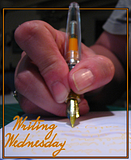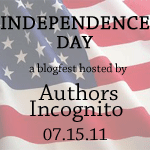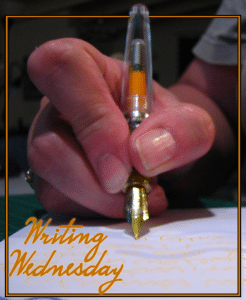Last week at ThrillFest, NYT bestseller William Bernhardt gave eight basics of plot as part of the CraftFest track. And my favorite point might just be his first.
1. Plot is the writer’s choice of events to tell the story of the character’s progression toward the goal or desire.
Sometimes as authors, we can let our characters run off with our story. That’s all well and good until suddenly they’re far afield from what we’d planned and going off in another genre and not even doing that well and stuck in a corner, and none of us knows how to get out. (Been there, done that!)
 We, the authors, are in control. We get to choose the events. We get to create the characters. Your characters not doing what you want? Change their motivations. Work harder on getting to what they really want, and then manipulate the story circumstances or character so what they want will get them to do what you want.
We, the authors, are in control. We get to choose the events. We get to create the characters. Your characters not doing what you want? Change their motivations. Work harder on getting to what they really want, and then manipulate the story circumstances or character so what they want will get them to do what you want.
This reminds me of a great example from a writing book I know I’ve read (I want to say Jack Bickham’s Scene and Structure, but it might be from Donald Maass or Sol Stein). In this example, the author needed the character, a nurse, to go back to check on a patient. Not hard, right? But the nurse was also busy, the patient on the other side of the complex, and a capable staff the nurse trusted was attending to him. So why would she make herself late and give herself the extra work when she knew the patient was in good hands?
I can’t remember the exact solution, but the author found some little detail that would bug the nurse—thinking she’d left something undone, perhaps. The nurse thought about that nagging little detail, watching the clock count down until the moment she could run back and check on it. This transforms the character action from the author jerking the character around to the author guiding the character and molding her into the person who would do exactly what you need her to.
This relates well to Bernhardt’s second point:
2. The plot must be right for the character—and vice versa.
The rest of the points:
3. The plot is composed of a series of conflicts. (See point 8 here.)
4. The protagonist should fail many times before succeeding.
5. The protagonist’s story is only as interesting as the antagonist makes it.
6. Readers like to be surprised.
7. Readers hate coincidence.
8. Conflict can be inner, personal or external.
What do you think? What’s your favorite “plot point”? (LOL)
Photo by Matthew McVickar
 important than talent in writing (emphasis mine)
important than talent in writing (emphasis mine)



 Thank you to all those who have ever sacrificed to protect our freedoms.
Thank you to all those who have ever sacrificed to protect our freedoms.

